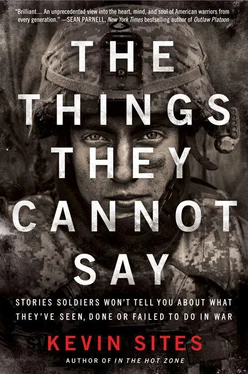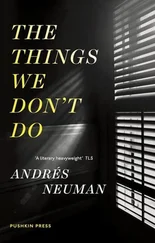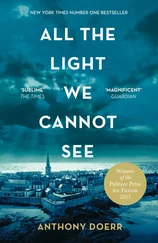During their downtime, the 3rd Platoon’s soldiers did what all soldiers do: cleaned their weapons, played cards and bullshitted with each other. I witnessed the taunting and merciless teasing, but also moments of clear-eyed introspection that made the soldiers, once again, seem like the vulnerable and innocent high school seniors they had mostly been just a year or two ago. But then, as I wrote in an online article for MSNBC.com at the time, they also did things like this:
Nearby one soldier passes a couple of American flag patches to another. In between the bars on the patch are the words, handwritten in ink: Dirty for Dirty. They are calling cards to put on the bodies of dead enemies, a non-sanctioned post-mortem psych-out. Something to let the Muktada al-Sader’s militia know who they are and what they are up against. The same soldiers tell me about a recent fight they were in in which a Shiite militiaman popped into an alleyway and began firing his AK-47 at a tank. “You could see the turret swivel around, train its 50 [caliber machine gun] on the guy and fire. It blasted a huge hole right through his middle.” He shows dinner plate size circumference with his hands.
Auton, I noticed, had a small chain attached to a belt loop on the front of his BDUs (battle dress uniform), which dangled into one of his pockets. When I asked him to show me what was tethered on the other end he lifted the chain from his pocket and retrieved a tiny book, which he flipped open and thumbed from right to left. Its pages were covered with Arabic script, a miniature Koran. Auton said it had been a gift given to him by his Turkish girlfriend, whom he met while stationed in Germany.
While there was a certain irony to a Christian American soldier carrying a Koran into battle against Muslim enemies, I found it more interesting that Auton simply ignored the grief that other soldiers gave him for having it. He carried himself with the rare confidence of someone who didn’t have to sell you anything, least of all his reasons for doing something. While he was like so many other troops who carried some special token into battle, Auton’s choice of lucky charm was my first clue that he was not just your average grunt. This was a soldier, I believed, who would answer my most difficult questions, such as the one I asked him next: How did he feel about all the killing he had done?
“When I got here I found out that pulling the trigger wasn’t as hard as I thought it would be,” Auton said from the back of the Bradley where we sat talking, with the troop hatch open. “All except the first one. It was ‘Wow, I just killed a man,’” he said. “You start thinking he coulda been a guy just protecting his family. But then you think, ‘Okay, he’s running around out here with an AK-47 shooting at us,’ then you just get over it. Move on.”
Auton did move on but he never forgot the details of his first kill. It was in a Sunni section of Baghdad known as al-Adhamiyah. Auton’s platoon was part of a QRF, or Quick Reaction Force, which stands ready to respond when another unit is attacked or needs help.
The platoon was ordered on a mission one night and rolled out of their base with tanks and Bradleys. They didn’t have to wait long for enemy contact. Almost as soon as they pushed into the neighborhood they were hit with rocket-propelled grenades and AK-47 fire. Most Bradleys are configured with three crew, a vehicle commander, driver and gunner, and carry six or seven additional troops crammed in a small hold in the rear. While the hammer of automatic rifle fire against the metal can make the troops feel like they’re inside a steel drum that’s being pounded on both sides, a rocket-propelled grenade round is much worse. It can be roughly equivalent to the explosive depth charges used against a submarine, whose concussion can send shock waves that leave both ears and bodies ringing.
After maneuvering to a position where the Bradley’s hatch could be lowered and the soldiers dismounted, Auton and members of his fireteam set up fighting positions using buildings and alleyways for cover. Once the shooting started, Auton says, the more restrictive rules of engagement went out the window; anything on the street was considered a fair target.
“I was set up on a corner with my squad leader and we had a guy headed in our direction who had his hands in his pockets,” says Auton.
While they couldn’t tell if he was carrying a weapon or not, the squad leader gave Auton the order to shoot him. Auton peered through the optical scope on his M4 rifle, lined up the reticle crosshairs on the man’s head, then gently squeezed the trigger. The bullet dropped slightly over the hundreds of feet of distance, but so did Auton’s target.
“I shot him in the throat at about two hundred to two hundred and forty meters. He fell to his knees, gasping for air.”
Auton and the squad leader moved in closer to inspect. The guy was still alive but hunched over. But Auton said they still weren’t sure what he had in his pockets.
“What do you want me to do?” Auton asked his squad leader. The squad leader hesitated for a few seconds.
The choice to complete the unfinished process of taking a life in war leads directly to consequences unknown. Some would say it carries twice the moral weight by offering the soldier another chance to reconsider the delivery of a mortal blow. But which decision will be easier for the soldier to live with, confirmation of the original intent to kill, or watching an enemy suffer by allowing him to continue to live or die without intervention?
This is perhaps the most poignant dilemma in Erich Maria Remarque’s classic novel of World War I All Quiet on the Western Front , in which German soldier Paul stabs a French soldier who has stumbled into his trench, but instead of dying immediately the man’s agony is both intimate and prolonged. Paul nearly goes mad watching him suffer from just a few feet away: “These hours… The gurgling starts again—but how slowly a man dies! For this I know—he cannot be saved. Indeed, I have tried to tell myself that he will be, but at noon this pretence breaks down and melts before his groans. If only I had not lost my revolver crawling about, I would shoot him. Stab him I cannot.”
Here, on this street in Iraq, for Auton and his squad leader, the questions had real consequences. Had the man been subdued? Was he no longer a threat or did he still conceal some unseen harm? The choice they would make would have a lifetime impact on them and would have to be justified on legal as well as personal and moral grounds.
The squad leader, believing the Iraqi could still be a threat, said, “Finish it.” Auton raised his rifle to the man a second time.
“I fired two rounds in his ear at two feet away.” His brains splattered across the street and blood seeped out in a large, dark crimson pool. When they pulled the now-dead man’s hands from underneath him and checked his pockets, Auton said they found a little black fragmentation grenade with the pin still in place. Auton said he and his squad set up on another corner and repeated the procedure several more times that night. When someone would run through the streets, his squad leader would spot him with the narrow beam of his SureFire flashlight and Auton would take the shot.
“I wasn’t there to care,” Auton said without any affection of false bravado. To him, it was a matter of ultimate practicality. “You don’t hold on to it. There’s a time for remorse, there’s a time to think about what happened. But it wasn’t that moment. You have to just be thankful it wasn’t you.”
I track Auton down by e-mail six years later. He’s still with the same unit based in Germany, but now leading a platoon as a staff sergeant rather than a member of a squad. He has done well by the Army and he feels they’ve done the same by him. And despite another deployment to Iraq, two years after we first met in Karbala, his attitude has changed little. He plans on being a “lifer,” making the Army his career. He broke up with his Turkish girlfriend after his deployment ended but tells me in an e-mail from Germany that he still carries his lucky charm.
Читать дальше












